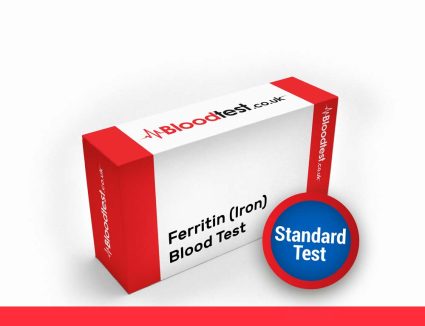In-Depth Understanding of Ferritin Blood Testing for Optimal Health
What is Ferritin? Exploring the Role of the Iron Storage Protein

Ferritin Blood Test in Dover: Ferritin plays a pivotal role as a crucial protein that serves as the body's primary repository for iron. This protein is essential for maintaining optimal iron levels, which are vital for several physiological processes, including oxygen transport throughout the body and the production of energy at the cellular level. The concentration of ferritin present in the bloodstream acts as a dependable marker for assessing the overall iron status of the body, making it possible to identify potential iron deficiencies or excesses. High ferritin levels can indicate an overload of iron, which poses risks for serious health conditions, such as hemochromatosis. On the other hand, low ferritin levels are often associated with iron deficiency, which can lead to complications like anaemia. Therefore, developing an extensive understanding of ferritin is essential for effective health management and preventing critical complications linked to abnormal iron levels.
The Significance of Ferritin Testing in Maintaining Your Health
The ferritin blood test is an indispensable diagnostic tool for identifying a variety of health issues, particularly those associated with iron metabolism and iron deficiency. Individuals exhibiting symptoms such as fatigue, weakness, or unusual paleness may be recommended to undergo this vital test to evaluate their iron levels accurately. Additionally, this test plays a significant role in diagnosing conditions like anaemia, which results from insufficient iron levels, and hemochromatosis, characterised by an accumulation of excess iron in the body. By analysing ferritin concentrations, healthcare professionals can develop tailored treatment plans, ensuring effective health management and mitigating potential complications. Regular testing is particularly crucial for individuals with chronic health conditions or those following restrictive diets, as they may be at a heightened risk for various iron-related disorders.
 What to Expect During the Ferritin Blood Test Procedure
What to Expect During the Ferritin Blood Test Procedure
The ferritin blood test is a straightforward and frequently conducted procedure that is typically performed in local clinics or hospitals. A qualified healthcare professional will draw a small volume of blood, usually from a vein in the arm. The procedure is relatively quick and causes minimal discomfort, making it accessible to a broad range of patients. After obtaining the blood sample, it is sent to a laboratory for comprehensive analysis. Results are usually available within a short timeframe, enabling timely diagnosis and appropriate treatment recommendations for individuals. Those residing in Dover benefit from local healthcare facilities that provide easy access to essential diagnostic services, empowering patients to monitor their iron levels effectively and promptly.
Decoding Ferritin Test Results: A Vital Component of Health Management

Interpreting the outcomes of a ferritin blood test is crucial for accurately diagnosing various iron-related conditions. Normal ferritin levels can vary significantly based on factors such as age and gender, with standard ranges estimated to be around 30-300 ng/mL for men and 15-150 ng/mL for women. Deviations from these normative values may indicate underlying health concerns. Elevated ferritin levels can point towards medical issues such as liver disease, while lower levels typically suggest iron deficiency anaemia. Engaging in a thorough discussion with a healthcare provider in Dover is essential to fully comprehend the implications of these results on individual health and to outline the necessary steps moving forward for optimal health management.
Preparing Effectively for Your Ferritin Test in Dover
Essential Preparation Steps Before Undergoing Your Ferritin Test
Preparation for the ferritin blood test may necessitate specific instructions that are imperative to follow diligently. In certain instances, fasting for several hours prior to the test may be required to ensure accurate results. It is essential to consult your healthcare provider in Dover for personalised guidance, as they can provide information regarding any dietary restrictions or medications that should be avoided before your test. Adhering to these preparatory guidelines not only aids in obtaining precise results but also improves the overall efficiency of the testing process, ensuring a smooth and stress-free experience at the clinic or hospital.
Understanding the Ferritin Blood Test Process: Step-by-Step Overview

The ferritin blood test itself is generally a quick and painless process. Upon arriving at the Dover medical facility, a trained technician will guide you through the procedure. After confirming your identity and the specific test being conducted, they will prepare to draw your blood. This typically involves cleaning the area on your arm with an antiseptic wipe, applying a tourniquet to enhance vein visibility, and inserting a needle to collect the blood sample. The entire experience usually takes only a few minutes, making it a convenient option for individuals who wish to efficiently monitor their health without significant disruption.
Post-Test Instructions: What to Anticipate After Your Ferritin Test
Once the blood sample has been collected, you can typically return to your normal activities without any specific restrictions. It is advisable to stay hydrated and maintain a balanced diet, especially if the test reveals any concerns regarding your iron levels. Most healthcare facilities in Dover will schedule a follow-up appointment to discuss your test results with you. This follow-up is imperative, as it allows for an in-depth conversation regarding your ferritin levels and any subsequent actions that may be necessary for your ongoing health management strategies.
Accessing Ferritin Testing Services Conveniently in Dover
Dover Health Centre: Your Primary Destination for Testing Services
Located centrally in Dover, the Dover Health Centre serves as an excellent facility for individuals seeking ferritin testing services. Renowned for its patient-centred approach, the centre offers a variety of diagnostic tests, including ferritin blood testing, in a comfortable and supportive setting. The staff are highly trained and dedicated to ensuring a seamless experience for all patients. Additionally, the central location enhances accessibility for residents of Dover and surrounding areas, significantly reducing travel time and improving convenience for all individuals seeking essential health services.
Dover Hospital: Comprehensive Diagnostic Services at Your Fingertips
Dover Hospital stands as a larger institution that provides a broad range of diagnostic services, including ferritin blood testing. Equipped with state-of-the-art laboratory facilities and a team of specialised professionals, the hospital ensures accurate and timely test results. The extensive array of services available allows patients to receive multidisciplinary care, making it an outstanding option for anyone requiring further assessment or treatment following their ferritin testing. With a steadfast commitment to high standards of patient care, Dover Hospital has established itself as a trusted resource within the community.
Private Clinics in Dover: Offering Flexible Testing Solutions
For individuals seeking expedited and potentially more private options, several private clinics in Dover provide ferritin testing services. These clinics often feature shorter waiting times and flexible appointment schedules, which can be particularly advantageous for busy individuals. Many private healthcare providers also deliver tailored services and individualised care, ensuring that each patient's needs are comprehensively met. This flexibility can contribute to a more convenient and confidential healthcare experience, ultimately aiding patients in effectively managing their iron levels while receiving personalised attention.
Interpreting Your Ferritin Test Results for Optimal Health Management
Normal Ferritin Levels: Understanding Their Significance for Your Health
Gaining a clear understanding of what constitutes normal ferritin levels is vital for effective health monitoring and management. Typical ferritin levels can vary significantly based on various factors, including age and gender. For instance, normal ranges are generally estimated to be around 30-300 ng/mL for men and 15-150 ng/mL for women. These benchmarks provide essential references for patients and healthcare providers in Dover, facilitating informed discussions regarding individual health. It is crucial to review your specific results with your doctor, as they can offer insights and context tailored to your unique situation, enabling you to remain proactive about your health and well-being.
High Ferritin Levels: Potential Health Implications You Should Know
Elevated ferritin levels can often indicate underlying health issues such as liver disease, iron overload, or inflammatory conditions. High ferritin levels suggest that the body is storing excess iron, which can lead to significant complications if left unaddressed. A thorough evaluation by a healthcare professional in Dover is essential to ascertain the root cause of these elevated levels. Additional diagnostic tests may be necessary to establish a comprehensive understanding of your condition, allowing for targeted treatment options that effectively manage the excess iron in your body and mitigate potential health risks.
Low Ferritin Levels: Recognising Symptoms and Taking Action
Low ferritin levels are frequently associated with iron deficiency anaemia, a condition that can lead to symptoms such as fatigue, weakness, and other health complications if not addressed promptly. Symptoms may vary significantly, making awareness and early testing critical for individuals who are at risk. Healthcare providers in Dover can offer dietary recommendations and iron supplementation as part of a personalised approach to increasing ferritin levels. Timely intervention for low ferritin levels can dramatically improve overall health and well-being, empowering individuals to lead more active and fulfilling lives.
Fluctuating Ferritin Levels: Understanding Variability and Its Implications
Fluctuating ferritin levels can sometimes indicate ongoing health changes or inconsistent dietary iron intake. It is not uncommon for ferritin levels to vary due to factors such as recent illnesses, dietary changes, or other lifestyle modifications. Regular monitoring by your healthcare provider in Dover is crucial, as it can provide valuable insights into how these fluctuations affect your overall health. A personalised approach to managing ferritin levels, which may include dietary adjustments and lifestyle changes, can help stabilise your iron stores and promote better long-term health outcomes for individuals.
Essential Follow-Up Care: Ensuring Your Health Remains a Priority
Engaging with Your Doctor: Discussing Your Test Results Thoroughly
After your ferritin blood test, it is imperative to schedule a follow-up appointment with your doctor in Dover to discuss your results comprehensively. This meeting provides a valuable opportunity to gain insights into your ferritin levels and their implications for your health and well-being. Your doctor can clarify any potential concerns regarding the test outcomes, whether they fall within the normal range or suggest a possible issue. Engaging in open dialogue during this appointment empowers you to make informed decisions regarding your health, including any necessary lifestyle modifications or treatments that may be required to optimise your well-being.
Exploring Tailored Treatment Options for Ferritin Imbalances
Depending on the results of your ferritin test, various treatment options may be recommended to address your specific health needs effectively. For individuals with low ferritin levels, healthcare providers in Dover may suggest dietary changes aimed at enhancing iron intake, such as incorporating more iron-rich foods like red meat, beans, and leafy greens into their diets. Additionally, iron supplements may be prescribed to boost ferritin levels effectively. Conversely, high ferritin levels may require further investigation and potential treatments aimed at managing the underlying conditions contributing to elevated iron levels. A tailored treatment plan is crucial for effectively addressing your specific health concerns and optimising your wellbeing.
The Importance of Ongoing Monitoring and Retesting of Ferritin Levels
Continuous monitoring and retesting of ferritin levels can be essential for effectively managing your condition. Depending on the initial test outcomes, your healthcare provider in Dover may recommend regular follow-ups to track changes in your iron stores. This proactive approach ensures that any emerging health issues can be promptly addressed, thereby reducing the risk of complications. Regular testing fosters a comprehensive understanding of your health, allowing for adjustments in treatment plans as needed to optimise your overall wellbeing and health outcomes.
Connecting with Local Support Networks in Dover for Enhanced Care
Joining a support group in Dover can significantly enhance your ability to manage ferritin-related concerns. These groups often provide a nurturing community, allowing individuals to share their experiences, challenges, and advice on navigating health issues related to iron levels. Accessing emotional support and practical guidance from others facing similar challenges can empower you to take control of your health journey. In addition to offering encouragement, these groups can also connect you with local resources, educational materials, and healthcare professionals who specialise in conditions associated with ferritin and overall iron health.
Resources and Support Services for Ferritin Management in Dover
Local Health Services: Comprehensive Support for Ferritin Issues
Dover is home to a variety of health services designed to assist individuals experiencing ferritin-related issues. Local clinics and hospitals not only provide ferritin testing but also offer comprehensive care for managing iron levels and related health conditions. Accessing these services is a vital step for anyone concerned about their ferritin levels, as they provide personalised guidance and treatment options tailored to individual health needs. Engaging with local health services fosters holistic care, ensuring that patients receive the necessary support for optimal wellbeing and health management.
Support Groups: Creating Community Connections for Better Health
In addition to professional healthcare services, several local support groups in Dover cater to individuals dealing with iron-related health concerns. These groups provide a welcoming environment where members can share personal stories, offer advice, and access valuable resources. Connecting with others who understand the unique challenges of managing ferritin levels can foster a sense of community and encouragement. Participating in these groups enhances overall wellbeing by providing practical strategies for effectively navigating health issues while building lasting friendships and support networks.
Educational Resources: Empowering Your Knowledge About Ferritin
Accessing educational materials is essential for anyone looking to enhance their understanding of managing ferritin levels. Many healthcare facilities in Dover provide pamphlets, brochures, and online resources covering a wide array of topics related to ferritin and iron health. By equipping yourself with knowledge, you can make well-informed decisions regarding your diet, lifestyle, and treatment options. Understanding the significance of ferritin and its role in your health empowers you to take proactive steps towards improving your iron levels and overall wellbeing, fostering a healthier lifestyle.
Frequently Asked Questions About Ferritin Testing: Essential Insights
What is the purpose of a ferritin blood test?
A ferritin blood test measures the level of ferritin, a protein responsible for storing iron in the body. It plays a crucial role in assessing your iron status and diagnosing conditions such as iron deficiency or iron overload.
How should I prepare for a ferritin blood test?
Preparation may involve fasting for several hours prior to the test. It is essential to consult your healthcare provider in Dover for personalised instructions tailored to your individual needs and circumstances.
What do normal ferritin levels indicate about my health?
Normal ferritin levels typically range from 30 to 300 ng/mL for men and 15 to 150 ng/mL for women. These levels indicate sufficient iron storage within the body, essential for maintaining overall health.
What does it mean if my ferritin levels are elevated?
High ferritin levels can indicate an excess of iron in the body, potentially leading to health issues such as liver disease or iron overload. Further evaluation by your doctor is necessary to determine the underlying cause and appropriate management.
What symptoms are associated with low ferritin levels?
Low ferritin levels often result in symptoms such as fatigue, weakness, and pallor. These symptoms may indicate iron deficiency anaemia, which requires prompt medical attention and intervention.
How frequently should I have my ferritin levels assessed?
The frequency of ferritin testing depends on your health circumstances. Your healthcare provider in Dover can offer guidance tailored to your specific needs and test results, ensuring optimal health monitoring.
Can my diet improve my ferritin levels?
Yes, incorporating iron-rich foods into your diet—such as red meat, beans, and green leafy vegetables—can help enhance ferritin levels significantly. Consult your healthcare provider for tailored dietary advice to support your health.
Are there side effects associated with iron supplements?
Common side effects of iron supplements may include gastrointestinal discomfort, constipation, or nausea. If you experience significant side effects, consult your healthcare provider for alternative options or adjustments.
Do I need a referral to obtain a ferritin blood test?
In many instances, a referral may not be required to access a ferritin blood test, especially at local clinics. However, it’s advisable to verify with your healthcare provider in Dover to ensure you have the necessary information.
What steps should I take if my ferritin levels fluctuate?
If your ferritin levels fluctuate, it’s crucial to consult your healthcare provider in Dover for a comprehensive evaluation and personalised advice. They can recommend appropriate monitoring and lifestyle adjustments to help stabilise your levels and improve your overall health.


